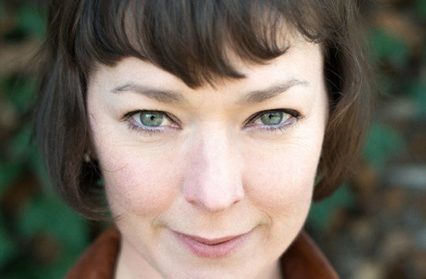M.G. Leonard discusses the inspiration behind writing stories for children about environmental issues and asks how fiction can stimulate environmental change.
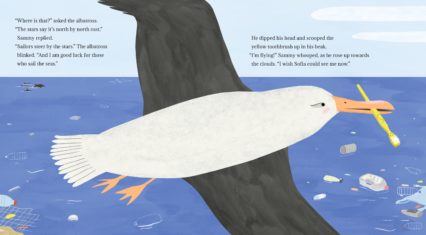
I was born by the sea, in Devon. When I was four, my family moved to Southend-on-sea. Now, as an adult, I live in Brighton. When I stare at the sea, which I do often, it calms me, providing perspective, reminding me that my problems are relatively small. I find it fascinating and faintly frightening. The sea holds more secrets than the night sky. It’s a wonderful playground to share with my children, and it’s one of the few outdoor activities that they don’t grumble about. I love the sea. It hurts my heart to think of what we have done to it.
In 2010 I read an article that said the ocean in our imaginations doesn’t exist anymore, because of the amount of rubbish we’ve thrown into it. This upset me enough to begin weaving storey strands on the subject. That was a decade ago but, the subject is so vast and so sad, I couldn’t find a way to write a story about it that wasn’t deeply depressing. And I am not interested in writing that kind of a story. I believe in hopeful endings.
In 2018, author and conservationist, Lauren St John and I formed the movement Authors4Oceans, which brought over fifty like-minded authors, including Michael Morpurgo, Jacqueline Wilson and Chris Riddell, together to campaign and bring pressure on our publishers and bookshops to think about their use of plastic. The publishing industry uses plastic packaging solutions for a number of tasks, and we asked that companies publish a plastics policy, demonstrating a move towards a non-plastic business model. One lone voice, or a single person, can struggle to make a difference, but united as a group we put pressure on our publishers – who are big businesses – to do better, as well as amplifying ocean conservation messages on our social media channels and in the stories we tell. It’s been gratifying to see a considerable change in attitudes to things like plastic straws and jiffy bags, which accelerated fast when David Attenborough’s Blue Planet II made everyone aware of the problem.
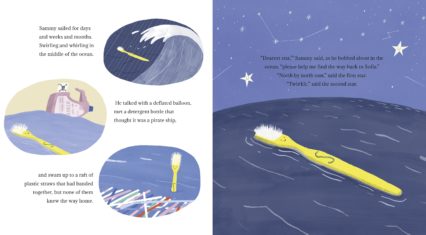
The desire to produce a book on the subject grew, until one day I realised that I’d been thinking about it wrong, that the story was too big for a chapter book. I wondered what it would be like if it were a picture book. The Tale of the Toothbrush began as a conversation I imagined taking place between an albatross – one of the birds worst affected by ocean pollution – and a friendly toothbrush. I imagined the toothbrush telling the albatross the story of his life, how he was made by humans in a factory to last four hundred years but was only used for three months before being thrown away; how he was now living a life of adventure on the high seas. From this conversation sprang the idea for my picture book. It’s about a toothbrush because I wanted the hero to be a plastic item that children would relate to. It had to be a cheerful bright colour and something that could be personified. And so, Sammy the cheerful yellow toothbrush was imagined into being.
Beneath what I hope is a charming and delightful story there is a serious theme. We cannot keep making and throwing away our toothbrushes, or any of the other many plastic items that end up in the oceans, and this can be seen in Daniel Rieley’s wonderful illustrations for the book. I suggest, rather than throwing them away, we reuse our toothbrushes once they’re no longer appropriate for cleaning our teeth, and that people seek out bamboo toothbrushes instead of buying plastic ones. A toothbrush is only one plastic item, but on average we use three to four every year and across our lifetime that equates to roughly three hundred toothbrushes per person! A small change can make a significant difference, especially if we all do it.
More than twelve million tonnes of plastic are dumped in the oceans each year. The scale of the problem is so big that it can feel overwhelming, but we mustn’t allow this to depress us into inaction. With a problem this size, there is no room for anything other than optimism. We put the mess in the ocean, it is our responsibility to clean it up. It is our problem to solve and if evolution is anything to go by, I’d say that one of the most successful traits of homo sapiens is problem-solving. We can and we will turn things around, but there’s no point waiting for someone else to fix it, and it will happen quicker if we all join together to help.
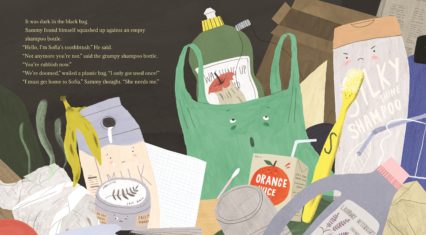
I know change isn’t easy. What changes have I made? I take one thing at a time and I’ve started small. I carry a reusable coffee cup and water bottle when I leave the house. My family uses bamboo toothbrushes. I employ the services of a good old-fashioned milkman (or milk person) so that my milk and fruit juice is delivered in glass bottles that are then collected for reuse. I buy organic vegetables with no packaging. I’ve gone back to using bars of soap rather than liquid soap in plastic dispensers. All of these things combined have reduced the family’s plastic waste dramatically, and it becomes easier to see what change we could make next.
Environmental issues are at the heart of everything I write, and I see no hierarchy in which one is more pressing than another, rather, they are an ecosystem of connected problems. I am the vice president of a charity called Buglife which campaigns to preserve important invertebrate habitats and stop the use of pesticides. The importance of insects in the ecosystem cannot be overstated and yet we’re prone to overlook them because of their size and our perception of them as pests. The human race is ever-expanding, destroying habitats and producing toxins and pollutants. It distresses me to be living in a time of mass extinctions. We will have to work hard not to be a plague or parasite to this planet. This important struggle is the concern of all of the protagonists I create in my stories. I use stories to communicate to children that they have a place in the fight and an important voice in the future of this planet, and they need to do nothing more than go outside and meet the wildlife that shares this world, learn about it and protect it.
I am by no means the first, nor will I be the last author to be inspired by a concern for the natural world. When I was a child I read and was changed by books like The Secret Garden, Wind in the Willows, Watership Down and The Secret of Farthing Wood. These stories are the antecedents to my Beetle Trilogy, in which I highlight the delicate balance of our ecosystems and the powerful role invertebrates – in particular, beetles –play in it, employing horrific villains, buffoonish bad guys and more poo than would be allowed in a book for grown-ups, to maximum effect.
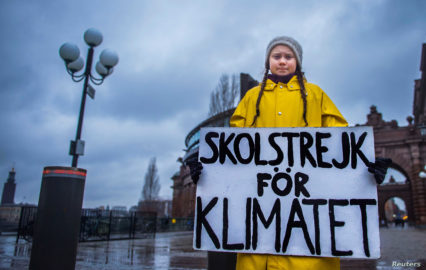
M.G. Leonard | Writing Stories to Inspire Change
I think it is unsurprising that so many writers are producing stories concerned with environmental issues, as they are the issues troubling the human race right now. I don’t know a single person who isn’t concerned about climate change and what we’ve done and continue to do to the ocean. There are lots of fantastic and inspiring books out there on the subject, however, I’m always disappointed when a narrative takes a nihilistic turn, or the solution is a magical unicorn fart from outer space. Real problems require real solutions. A shoulder shrug and a doomy ending don’t help anyone, nor does a preposterous sparkling cheat of a finale. I try to write plausible and hopeful endings. I employ humour, fact and drama to the best of my ability to persuade the reader that the nerdiest of subjects is fascinating if you have the right perspective. My newest book – the one I should be editing when in fact I am writing this article – is about a bird-watcher called Twitch. I find myself creating an army of unusual heroes, having now written about an insect lover, a train-spotter and a bird-watcher, and they have taught me much.
If there’s one thing my young characters have in common, it’s a love for the natural world. Were they real people, they would be striking for their future, using their voices for good and fighting climate change. When Greta Thunberg picked up her first placard, to me, she seemed to appear like a heroic character stepping from the page of a book. A character whom all my characters would immediately rally behind. Her courage and straight-talking give me hope. And she is not the only young person making a difference out there. I believe young people are the most important people on the planet, that is why I write for them.
Am I a good environmentalist? I ask myself that every day and I know the answer. Sometimes I feel guilty for being sat at a desk thinking up stories when what the environment needs is a do-er, someone who will get out there and change things. But if my stories are good enough, and taken to heart by enough readers, perhaps, they will encourage many do-ers, who’ll use bamboo toothbrushes, love beetles and birds, and travel by train. That would be wonderful.
M. G. Leonard is an award-winning, bestselling writer of children’s books. Her books have been translated into over forty languages and a TV series based on the Beetle Boy trilogy is currently in development. She is a vice president of charity Buglife and her beetles have appeared on Blue Peter, Springwatch Unsprung, Countryfile, Meet the Author with James Naughtie, Sky News, and featured in the BBC documentary, The Bug Couple. Her newest project is Adventures on Trains.


